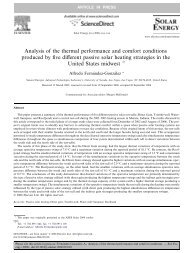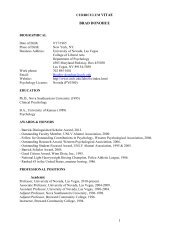2013 Conference Proceedings - University of Nevada, Las Vegas
2013 Conference Proceedings - University of Nevada, Las Vegas
2013 Conference Proceedings - University of Nevada, Las Vegas
- No tags were found...
You also want an ePaper? Increase the reach of your titles
YUMPU automatically turns print PDFs into web optimized ePapers that Google loves.
DEVELOPING DISCOURSE THAT PROMOTES REASONING AND PROOF:A CASE STUDY OF A CHINESE EXAMPLARY LESSONLianfang Lu<strong>University</strong> Of Arkansas At Little RockLxlu@Ualr.EduThomas E. RicksLouisiana State <strong>University</strong>Tomricks@Lsu.EduAs part <strong>of</strong> a larger study that investigated mathematics teaching reform in China (Lu, 2011), thisstudy focused on a high-quality model lesson that represented the recommended instructionalpractices in current Chinese mathematics education reform. We focused our analysis on thedesign <strong>of</strong> the lesson, the unfolding <strong>of</strong> discourse, and the development <strong>of</strong> students’ mathematicalreasoning and pro<strong>of</strong> in the lesson.Theoretical perspectivesReasoning and pro<strong>of</strong> are regarded as fundamental aspects in mathematics study for all grades(NCTM, 2000); however, research has shown that students have various difficulties when theywere engaged in reasoning and pro<strong>of</strong>s. For example, students tend to rely on the authority fortruth; lack <strong>of</strong> understanding <strong>of</strong> pro<strong>of</strong>; misuse empirical examples as arguments for pro<strong>of</strong>s andlack <strong>of</strong> strategies <strong>of</strong> pro<strong>of</strong>s (Harel& Sowder, 2007, Stylianou, Blanton, &Knuth, 2009;Thompson, Senk, Johnson, 2012).Mathematics educators have noticed the role <strong>of</strong> discourse in helping students overcome thesedifficulties. A significant challenge teachers face is how to develop discourse that promotesrobust mathematical understanding and abilities <strong>of</strong> reasoning (Stein, et al., 2008). Stein et al.(2000) highlighted that different tasks may engage students in different levels <strong>of</strong> mathematicalreasoning. They pointed out that tasks in discourse with higher-level cognitive demands, such asdoing mathematics activities provide opportunities to engage students in high-level thinking.Research also indicated that heuristic questions and suggestions asking for explanation andextension deepen students’ reasoning (Goldin, 1997). For instance, Martino and Maher (1999)found that the teacher’s posing <strong>of</strong> timely questions, while challenging learners to advance theirunderstanding assist students find successful solutions. Yackel and Cobb (1996) identifiedsociomathematical norms that encourage listening and explanations support students to developexplanation, justifications, and mutual understanding. More recent interest has pointed to“inquiry-based” instructional approach to improve reasoning and pro<strong>of</strong> through engagingstudents in problem-solving (Smith, 2012).<strong>Proceedings</strong> <strong>of</strong> the 40 th Annual Meeting <strong>of</strong> the Research Council on Mathematics Learning <strong>2013</strong> 213




